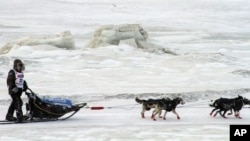Organizers of Alaska's famed Iditarod sled-dog race have opted for an alternate route this year, citing unsafe conditions and a lack of snow in critical areas of the 1,000-mile (1,600-kilometer) trail to Nome, officials said on Wednesday.
The change would move the official start of the race to Fairbanks, some 300 miles (480 km) north of the traditional location in Willow, a small community about 80 miles (130 kilometers) north of Anchorage, in southern Alaska.
“We did a lot of work on trail parts that were bad, but there just isn't enough snow to get over the mountains,” Iditarod board director Andy Baker said. “The issue was making this safe for the mushers and the dogs.”
He said a team of mushers examined the areas and quickly came back with the decision, which marks only the second time in race's 43-year history that an alternate route has been used. Race officials last used an alternate route in 2003.
“They said there was no way they would do it; it was an easy choice,” said Baker.
The punishing race, in which competitors brave darkness, steep climbs and temperatures well below freezing, commemorates a 1925 rescue mission that carried diphtheria serum by sled-dog relay to the coastal community of Nome.
Organizers said the race's ceremonial jaunt was on schedule for March 7 in Anchorage, but the formal timed start of competition will be delayed until March 9 so dog teams can travel to Fairbanks.
Race officials took heat last year for not selecting an alternate route. Baker said getting the new route in place early this year gives teams a chance to prepare for the new checkpoints on a race that takes serious competitors about nine days to complete.
Last year, 26-year-old Dallas Seavey and his canine team finished the race through the Alaskan tundra in 8 days, 13 hours, 4 minutes and 19 seconds.
So far 79 mushers, including two-time winner and defending champion Seavey, have registered to compete, some coming from as far away as Norway, New Zealand, Sweden and France.
In December, the committee announced an additional $50,000 in prize money for the top five finishers. The winner will claim $70,000, almost $20,000 more than last year.









